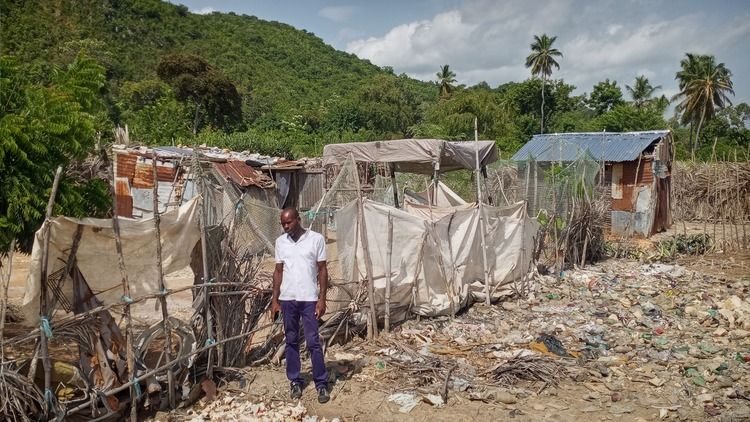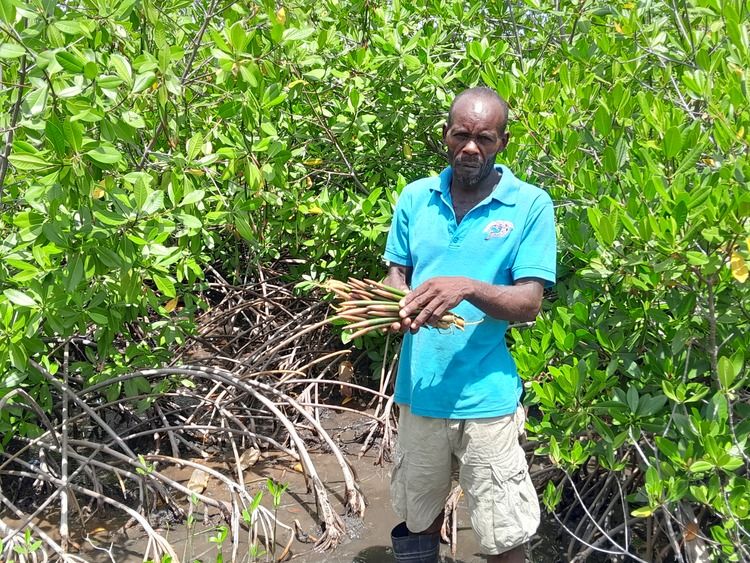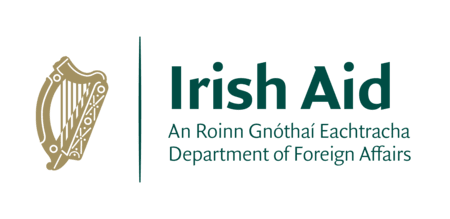 Stories
Stories
August 14, 2024 • 4 min read
Haiti is the most climate-vulnerable country in Latin America and the Caribbean. Recent years have seen an intensification of storms, erosion, flooding, and droughts in the country. Climate change is causing sea levels to rise, while groundwater salinity is growing year on year. These challenges place immense pressure on marine ecosystems, resulting in coral bleaching, reduced biodiversity, increased flood risk, and depleted fish stocks - all of which severely affect coastal fishing communities.
Marine Ecosystems at Risk
As marine ecosystems are strained, fishing communities and marginalised groups face reduced catch and loss of income, leading to increased food insecurity and malnutrition. Coastal storms, exacerbated by climate change, heighten the risk of drowning for fishers and erode natural buffers from mangrove forests, further exposing communities to storm damage. Flooding from extreme weather events contaminates freshwater sources, increasing the risk of waterborne diseases. Proactive climate action programmes are crucial for mitigating this risk.
Unsustainable practices, such as pollution, overfishing, and mangrove deforestation, further amplify the impacts of climate change. Marginalised groups, including young people, women, and persons with disabilities, are particularly vulnerable due to social and economic inequalities. These include limited financial independence, decision-making power, and mobility.

Miskad’s community in southern Haiti is highly vulnerable to climate-hazards, including flooding, due to mangrove deforestation, among other factors.
Climate Action
GOAL Haiti, with generous funding from Irish Aid through the Irish Civil Society Partnership (ICSP) programme, is implementing Blue Economy initiatives to restore and protect mangroves. This is done in tandem with promoting sustainable development and responding to the differentiated needs and capacities of diverse individuals and groups in the Grand’Anse Department, Southern Haiti.
GOAL’s Resilience of the Blue Economy programme aims to increase food and nutrition security and income for communities dependent on small-scale fisheries, improve management and protection of marine natural resources and biodiversity, and increase the resilience of coastal communities to climate-related shocks and stresses.
Mangrove protection and restoration are crucial components of our Blue Economy interventions. Mangroves bolster the climate resilience of vulnerable communities by acting as a buffer against coastal storms, reducing coastal erosion, and mitigating rising sea levels. Their capacity to store and sequester carbon means that they have huge potential to contribute to climate change mitigation efforts. Additionally, mangroves are vital for biodiversity, providing a breeding ground for essential species and supporting seafood stocks.

Miskad planting mangrove seedlings, under GOAL’s ICSP-funded climate action programme: Resilience of the Blue Economy.
Restoring Mangrove Forests
Ti Miskad, a 42-year-old fisher, agriculturist, and member of a GOAL Blue Economy mangrove management committee in Grand’Anse, exemplifies the success of these interventions. GOAL’s mangrove protection and restoration programme has empowered Miskad and thousands of others to contribute to the preservation of critical coastal ecosystems, diversify their sources of income, and enhance food security in Grand’Anse’s coastal communities.
According to Miskad, mangrove deforestation was a common practice before GOAL’s intervention. Since then, his community has developed expertise in the preparation and cultivation of mangrove seedlings. This know-how has enabled the creation of a thriving local market for these seedlings, generating a new source of income for residents in his community in Corail, Grand’Anse. Additionally, Miskad’s community has received training in sustainable fishing practices and in village savings and loan groups, improving their environmental stewardship and working towards a sustainable future.
Miskad says that efforts to protect and reforest the mangroves in his locality have succeeded. GOAL has planted over 25,000 mangrove seedlings at two sites in the Grand’Anse department, specifically in the Communes of Corail and Bonbon. The recently planted mangrove seedlings play a crucial role in enhancing the climate resilience of vulnerable coastal communities and preserving marine biodiversity, including fish stocks.
Through GOAL’s Blue Economy programme, supported by Irish Aid, Miskad has also become a trainer in beekeeping. Bees make highly desirable honey by feeding on mangrove flowers, offering nearby communities the opportunity to cultivate mangrove honey and diversify their diets and income.
Gender Inclusive Programming
Community-led action and commitment of residents to the preservation and restoration of their coastal environment continues even after the project’s conclusion. More than 2,500 people have been educated on practices for mangrove protection and restoration. They were also educated on the ecological, social and economic value of such ecosystems.
Moreover, GOAL strives to ensure a gender-sensitive approach to climate action. We achieve this by understanding the specific and differentiated needs of those affected by the project, involving local participation to ensure inclusion and acceptance, and providing training tailored to diverse groups.
Our training sessions are conducted in accessible spaces, led by diverse staff, and scheduled so as to accommodate everyone’s availability, including consideration of gendered roles and responsibilities. Our restoration groups include at least 30% women, supported through CFW (Cash for Work) activities related to mangrove planting. These female participants come from fishing associations, community members, and female heads of households.
This approach has led to enhanced community acceptance, sustainability, and overall well-being, with significant benefits for women. It has supported their empowerment, helping them to become financially independent and strengthen their participation in decision-making, including those related to household food consumption, education, and health.
These initiatives not only strengthen the climate resilience of communities like Miskad’s through vital mangrove protection and restoration but also promote sustainable development by creating economic opportunities and improving community well-being.
Learn more about GOAL’s work in Haiti.

